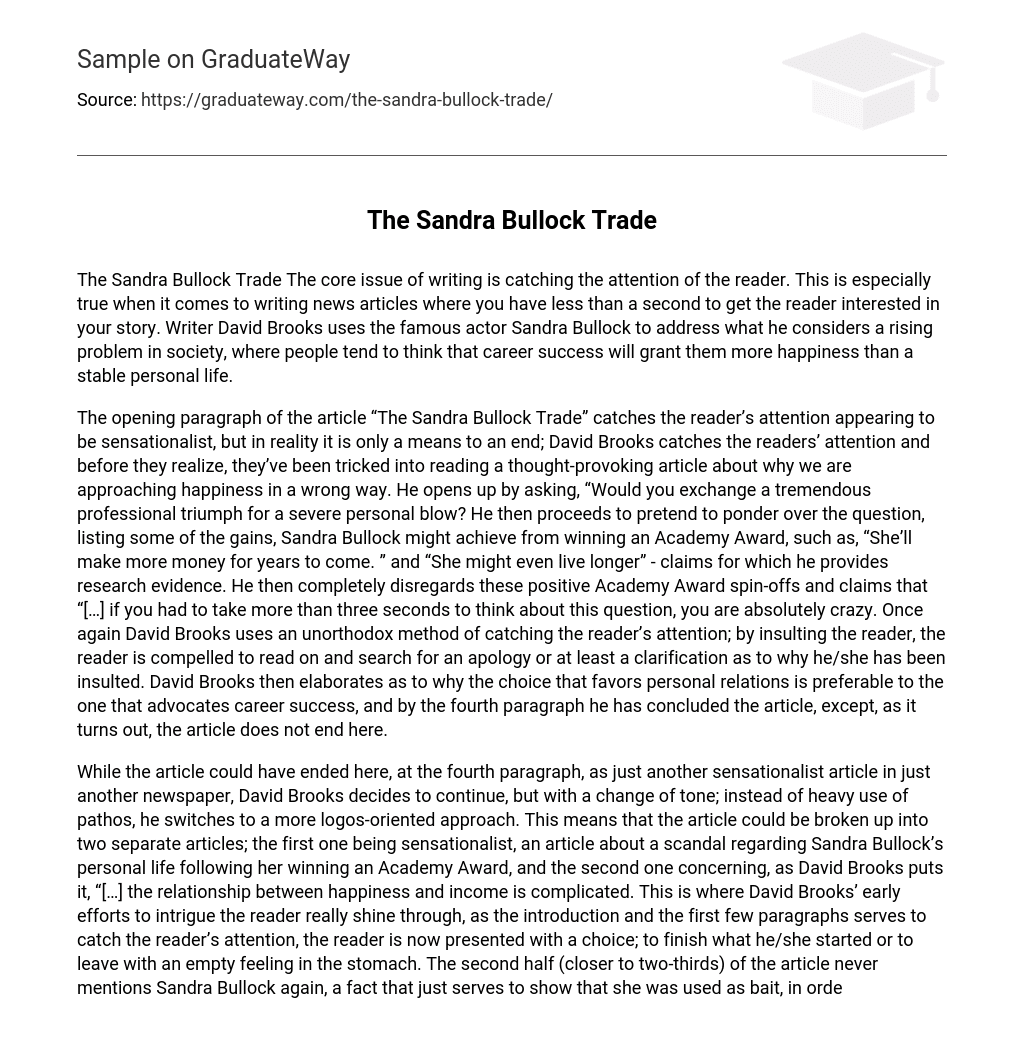The core issue of writing is catching the attention of the reader. This is especially true when it comes to writing news articles where you have less than a second to get the reader interested in your story. Writer David Brooks uses the famous actor Sandra Bullock to address what he considers a rising problem in society, where people tend to think that career success will grant them more happiness than a stable personal life.
The opening paragraph of the article “The Sandra Bullock Trade” catches the reader’s attention appearing to be sensationalist, but in reality it is only a means to an end; David Brooks catches the readers’ attention and before they realize, they’ve been tricked into reading a thought-provoking article about why we are approaching happiness in a wrong way.
He opens up by asking, “Would you exchange a tremendous professional triumph for a severe personal blow? He then proceeds to pretend to ponder over the question, listing some of the gains, Sandra Bullock might achieve from winning an Academy Award, such as, “She’ll make more money for years to come. ” and “She might even live longer” – claims for which he provides research evidence. He then completely disregards these positive Academy Award spin-offs and claims that “[…] if you had to take more than three seconds to think about this question, you are absolutely crazy.
Once again David Brooks uses an unorthodox method of catching the reader’s attention; by insulting the reader, the reader is compelled to read on and search for an apology or at least a clarification as to why he/she has been insulted. David Brooks then elaborates as to why the choice that favors personal relations is preferable to the one that advocates career success, and by the fourth paragraph he has concluded the article, except, as it turns out, the article does not end here.
While the article could have ended here, at the fourth paragraph, as just another sensationalist article in just another newspaper, David Brooks decides to continue, but with a change of tone; instead of heavy use of pathos, he switches to a more logos-oriented approach. This means that the article could be broken up into two separate articles; the first one being sensationalist, an article about a scandal regarding Sandra Bullock’s personal life following her winning an Academy Award, and the second one concerning, as David Brooks puts it, “[…] the relationship between happiness and income is complicated.
This is where David Brooks’ early efforts to intrigue the reader really shine through, as the introduction and the first few paragraphs serves to catch the reader’s attention, the reader is now presented with a choice; to finish what he/she started or to leave with an empty feeling in the stomach. The second half (closer to two-thirds) of the article never mentions Sandra Bullock again, a fact that just serves to show that she was used as bait, in order to engage the reader.
Rather than Sandra Bullock’s personal life, it presents the reader with several thought-provoking statements based on scientific research and argues that while happiness and income are directly related to some point, they stop affecting each other after your income has reached a certain level, as it is pointed out in the following quote, “[…] poor nations become happier as they become middle-class nations. But once the basic necessities have been achieved, future income is lightly connected to well-being.
David Brooks points out the fact that governments and schools seem to indoctrinate their students to think that there is a direct correlation between income and happiness, while modern research shows that this is simply not true, as seen in, “According to one study […] being married produces a psychic gain equivalent to more than $100,000 a year. ” and “Most schools and colleges spend too much time preparing students for careers and not enough preparing them to make social decisions.
This also serves to show an interesting development in the article as David Brooks has changed the subject of the narrative from a particular person, Sandra Bullock, to people in general and again to the government and schools; one could state that he moves from a particular point of view (Sandra Bullock) to a more universal point of view (i. e. how it really works for people and countries around the world). It is also worth noting that David Brooks points out that people generally “[…] hit peak happiness just after retirement at age 65. , an age at which people are less likely to have a high income and more likely to have a stable relationship.
However, his point is that if society keeps evolving and unfolding in the same way as it does now, we’ll end up being less happy generally, yet earning more money annually, than earlier. Tendencies in the western culture already serve to show this; stress has forced its way into society, decreasing the happiness-level of all those affected, and an increasing number of countries are trying to deal with declining birthrates – possible markers of an increased drive towards carrier and cknowledgements at an expense of close relationships.
Thus, David Brooks manages, through a clever use of sensationalist buzzwords and gossip, to catch the attention of a reader wanting to catch up on the latest celebrity news and actually make them read a provocative article on why what they might think and do and how they act in their everyday life might be wrong.





